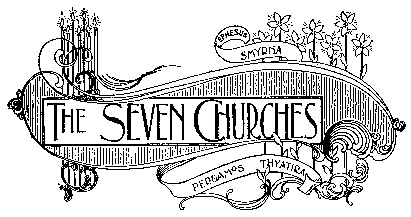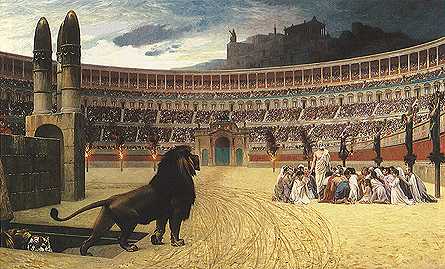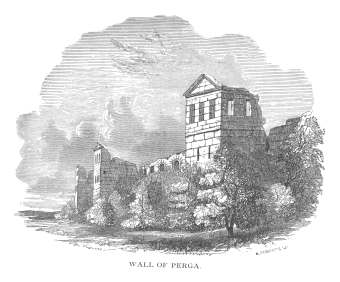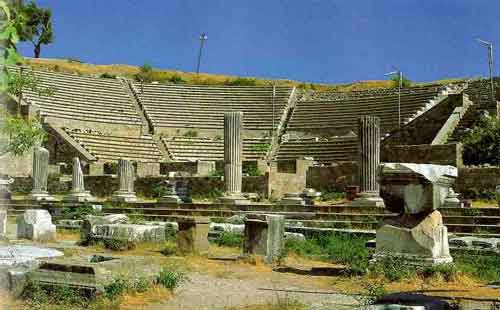Revelation 2:1-13
r02a


(v1)
"Unto the angel of the church of Ephesus write; These things saith he that
holdeth the seven stars in his right hand, who walketh in the midst of
the seven golden candlesticks; (2) I know thy works, and thy labour, and
thy patience, and how thou canst not bear them which are evil: and thou
hast tried them which say they are apostles, and are not, and hast found
them liars: (3) And hast borne, and hast patience, and for my name's sake
hast laboured, and hast not fainted.
(4) "Nevertheless I have
somewhat against thee, because thou hast left thy first love. (5) Remember
therefore from whence thou art fallen, and repent, and do the first works;
or else I will come unto thee quickly, and will remove thy candlestick
out of his place, except thou repent. (6) But this thou hast, that thou
hatest the deeds of the Nicolaitans, which I also hate.
"He that hath an ear, let
him hear what the Spirit saith unto the churches; To him that overcometh
will I give to eat of the tree of life, which is in the midst of the paradise
of God." (Rev. 2:1-7)
The pattern helps
us compare
With chapter 2 we begin
a study of the seven churches. We already discussed why John wrote to the
"angels" of churches. I agree
with the Bible students who see the churches as descriptions of Christ's
people at successive periods during the Christian era.
You are probably already
aware that the counsel to each church follows a general pattern. Let me
mention the elements I see in this pattern so you can think about them
as you read the descriptions in your Bible. With each element, I'll share
what I see for the first church. You might have fun making a chart. You
may wish to compare it with mine,
03T.
The first element is Christ's identification of Himself drawn from John's complete description of Him at the end of chapter 1. You will find the other churches are likewise linked to certain characteristics of Christ in chapter 1. Why do you think Christ described Himself differently to each church?
The Nine elements
in the descriptions of the seven churches
The first
church as an example
________________________
.
| Description of Christ | Holds 7 stars, walks among 7 candlesticks |
| What Christ knows | Works, labor, patience |
| Commendation (words of approval) | Tested false prophets, perseverance |
| Rebuke | Lost first love |
| Counsel | Remember, repent, do first works |
| Warning | Lampstand will be removed |
| What you have | My hatred for Nicolaitans |
| Reward for overcomers | Eat from tree of life |
| Other promises | (none, for this church) |
The picture of Jesus walking
among the churches (candlesticks) is a precious one. He left this earth
but is as certainly with us as He was with the disciples!
"I will not leave you comfortless:
I will come to you. Yet a little while, and the world seeth me no more;
but ye see me: because I live, ye shall live also." (John 14:18, 19)
And, surprise, He had made
the same promise to the people of the Old Testament.
"I will walk among you and
be your God, and ye shall be My people." (Lev.
26:11,12).
I want to always hold that hand. I know you do too.
"Nevertheless I have somewhat
against thee, because thou hast left thy first love.
First love See the table
wich discusses this verse.
Note on Verse 5
Fallen?
Paul wrote a significant
message to the Thessalonian believers. Apparently, from his previous letter
(1 Thess. 4:16, 17) they thought Jesus would return very soon. But the
message to them clarified that apostasy would come first. In fact, the
fall (falling away) of the church had already begun.
"Now we beseech you, brethren,
by the coming of our Lord Jesus Christ, and by our gathering together unto
him, That ye be not soon shaken in mind, or be troubled, neither by spirit,
nor by word, nor by letter as from us, as that the day of Christ is at
hand. Let no man deceive you by any means: for that day shall not come,
except there come a falling away first. . . ." (2 Thess. 2:1-3).
And Jesus, through John, confirms
that the first of the seven churches had left its first love. What does
this mean to us? Does God work through organized church leadership? I believe
He does. It says that apostasy came in early. Should we then refuse to
belong to a church body? Again, we cannot jump to that conclusion he1025.
I believe we need to personally make our calling and election sure before
God. Christ will purify His church (those who claim to be His people).
He will separate wheat from tares. Then He will come. We study Ephesians
5 to learn God's plan for husbands and wives. Notice that it reveals His
plan for His church, too.
"Husbands, love your wives,
even as Christ also loved the church, and gave himself for it; That he
might sanctify and cleanse it with the washing of water by the word, That
he might present it to himself a glorious church, not having spot, or wrinkle,
or any such thing; but that it should be holy and without blemish." (Eph.
5:25-27).
The marriage between Christ
and His purified church has not yet happened. He is helping her be ready,
then He will present her to Himself (Rev. 19:7, 8). I want to be part of
that cleaning and ironing process. I want to be a wheat kernel, not a weed
seed. And we, each one, can be faithful by His marvelous grace.
Remove thy candlestick
They lost the special
blessing of the Holy Spirit. See on re0112.
See verse 6 in tableThe
pages are partly merged.
The Nicolaitans
"But this thou hast, that
thou hatest the deeds of the Nicolaitans, which I also hate." (Rev. 2:6)
So true faith, by which
we reach out to accept the free grace of God, is reflected in our behavior.
The tree is known by its fruit. The Nicolaitans appear once more in the
Bible. We will meet up with them again when we visit the church at Pergamos.
Note on verse 7
A last look at
the first church
 "He that hath an ear, let him hear what the Spirit saith unto the churches;
To him that overcometh will I give to eat of the tree of life, which is
in the midst of the paradise of God." (Rev. 2:7)
"He that hath an ear, let him hear what the Spirit saith unto the churches;
To him that overcometh will I give to eat of the tree of life, which is
in the midst of the paradise of God." (Rev. 2:7)
.
To whom is the message addressed?
Are we among that group? Who is speaking to the churches? Where did we
last notice the "Spirit"? re0110.
What does that verse and this one tell us about the relationship among
Christ, the Bible authors, the Spirit, and us? For whom is the promised
reward? How does this group compare to the groups promised rewards for
the other churches?
The tree of life! Why might
this have been the prize for the overcomers in the first church? Does this
echo the message of Romans 6? I think so. Jesus was victorious at the point
where Adam failed. Here the first church, in the strength of Jesus, was
to be victorious where our first parents failed. And because we have ears,
we too may be overcomers and eat from the tree. Praise God. And in
the literary pattern for the whole book, do you see a match? (Try re2202).
I've mentioned a number of
thoughts worthy of more study, and you could add some I didn't even see.
This just reminds us how power packed the words of Scripture are.
Note on verse 9
Smyrna – Rich
poor people and pretend Jews
"And unto the
angel of the church in Smyrna write; These things saith the first and the
last, which was dead, and is alive;" (Rev. 2:8)
I know thy works, and tribulation, and poverty, (but thou art rich) and
I know the blasphemy of them which say they are Jews, and are not, but
are the synagogue of Satan. (Rev. 2:9). Christ identifies with His faithful
ones.
The picture here is of tribulation.
The next verse counsels: "Do not fear any of those things which you are
about to suffer." It was a rough time for God's people. I love the words,
"but you are rich." In worldly terms they were poor. By heaven's measure,
rich.
". . .Hath not God
chosen the poor of this world rich in faith, and heirs of the kingdom which
he hath promised to them that love him?" (James 2:5.)
We need to recognize what
is symbolic in the book of Revelation. Actually the book is loaded with
symbols. I'm not in favor of making up arbitrary symbolic meanings for
things of the Bible. If it's symbolic, it should be evident in comparing
other passages and particularly in its own context. The "riches" are symbolic
of spiritual wealth. Thus these Christians were poor and rich at the same
time.
Is pretending to be a Jew
also symbolic? Paul wrote about what it takes to be a Jew in a similar
symbolic sense.
"For he is not a Jew, which
is one outwardly; neither is that circumcision, which is outward in the
flesh: But he is a Jew, which is one inwardly; and circumcision is that
of the heart, in the spirit, and not in the letter; whose praise is not
of men, but of God." (Rom. 2:28, 29.)
The Jews had been the chosen
people — chosen to bear the truth about God to the world. It's true that
they lost that status as a people when they rejected Christ. (For example,
study Matt. 23:36-39; Luke 13:5-9; Dan. 9:24). Here were people claiming
to be faithful to God when, in reality, (continuing the symbolism) they
were from the synagogue of Satan. In Acts 20:29, 30, Paul predicted this.
The verse has interesting contrasts. Looking poor but being rich, and looking
Jewish and being false.
Note on verse 10
Faithful unto
death
"Fear none of those things which thou shalt suffer: behold, the devil shall cast some of you into prison, that ye may be tried; and ye shall have tribulation ten days: be thou faithful unto death, and I will give thee a crown of life." (Rev. 2:10)
Faithful unto death! Would
I rather die or be tortured rather than deny my Lord by word or act or
motive? Would you? This is the ultimate question. It is indeed a test.
We may pray that God would work in us building the strength of character
that would be ready for any test. But there are other tests that sneak
up on us — indulgence of appetite, unkind words, impure thoughts, refusal
to forgive. God will help us with them, too.
"And they overcame him [Satan]
by the blood of the Lamb, and by the word of their testimony; and they
loved not their lives unto the death." (12:11).
In time of trial we may draw special comfort from the message. It is from the One "who was dead, and came to life." In contrast to death, are the promises, "I will give you a crown of life." and "He who overcomes shall not be hurt by the second death." Here are a few verses about the second death. We will look more closely when we get to chapter 20.

Here are some passages to
look up. Some have more than one verse. 1co1522,
1th0416,
re2006.
"But the rest of the dead lived
not again until the thousand years were finished. This is the first resurrection."
"And the sea gave up the dead [those from verse 4 who did not live again
till the 1000 yrs. were finished] which were in it; and death and hell
[the grave] delivered up the dead which were in them: and they were judged
every man according to their works. And death and hell were cast into the
lake of fire. This is the second death." (Rev. 20:5, 13-15).
Ten days
Persecution from paganism
had been increasing. Probably the fiercest time of persecution (303 to
313 A.D.) began during the reign of Emperor Diocletian. Religious freedom
was granted by Constantine in 313. Some argue that the ten days are not
ten years (calculating a year for a day) but a brief time.
Diocletian ruled from 284 to 305.
Marvelous gift, a crown of
life bought by the blood of Christ who died the death I deserve! For whatever
trial God allows to come, He has provided sufficient grace!

Note on verse 12
Pergamos
We begin looking at the counsel for the third church.
"And to the angel of the church in Pergamos write; These things saith he which hath the sharp sword with two edges;" (Rev. 2:12). Also note re0116.)
Sword
The people of Pergamos needed the testimony of the Word.
Hold fast to my
name
The church never directly
abandoned the name of Christ as far as the words go, but "name" means character,
as we may deduce from re1401c.
 0213
0213
Where Satan's
throne is
We saw Satan getting a place
in the Smyrna church, too, but it was a "synagogue." Here it is a throne.
We may conclude that the evil in the religious realm was now taking hold
of the political. See is1412
and in the table comments for this verse.
". . . thou holdest fast my name, and hast not denied my faith, even in those days wherein Antipas was my faithful martyr, who was slain among you, where Satan dwelleth." (Rev. 2:13)
The picture shows the Roman Theater of Asklepieion at Pergamos – the modern city of Bergam, Turkey. Click to see a page with two other pictures.
|
|
|
|
|
|
|